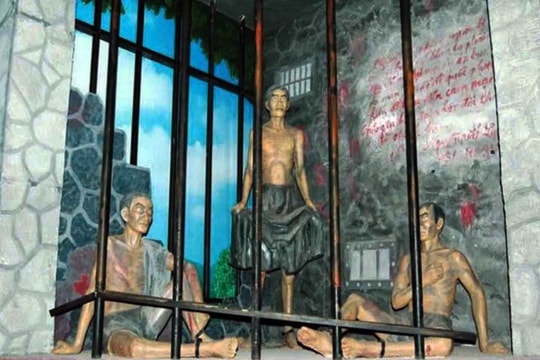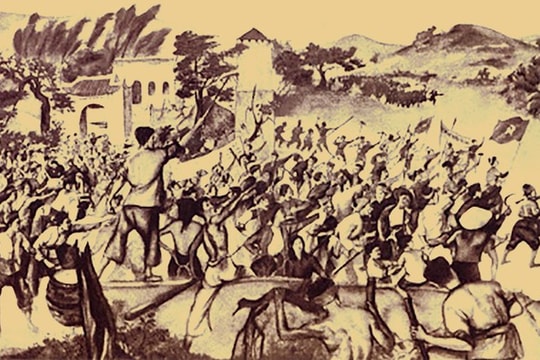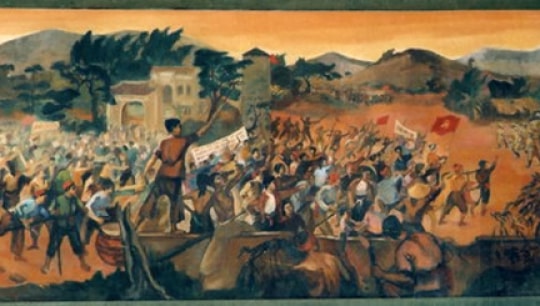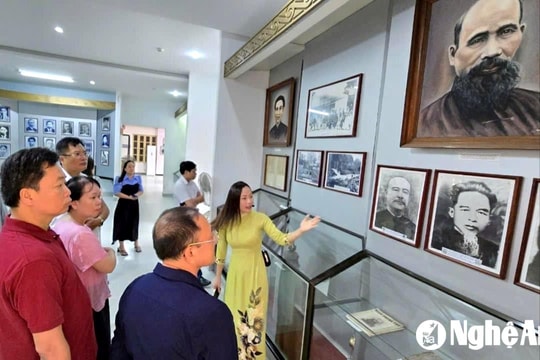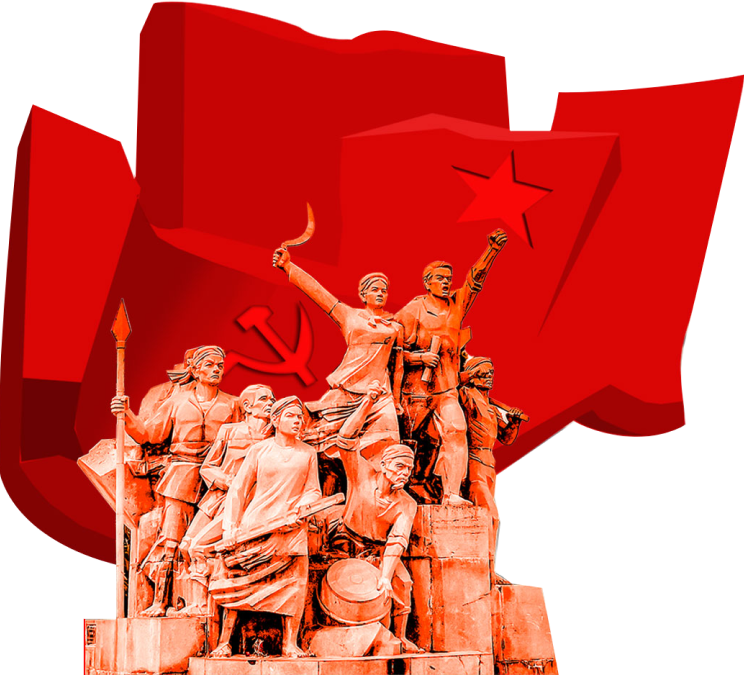Martyr Nguyen Huu Giang devoted his youth to the Nghe Tinh Soviet movement.
Comrade Nguyen Huu Giang always believed in the victory of the revolution led by the Communist Party. Comrade Nguyen Huu Giang was captured by the enemy, tortured, and heroically sacrificed his life in a prison cell in Kon Tum in 1933, when he was just 29 years old.
Throughout the struggle for national liberation, generations of Quynh Hong (Quynh Luu) children were ready to join the army, volunteer, and dedicate their entire youth and blood to the revolutionary cause of the Party.,building villages, preserving the homeland. Especially, in the Nghe Tinh Soviet movement in 1930-1931, representing the loyal and indomitable sons of Quynh Hong homeland was comrade Nguyen Huu Giang.
Comrade Nguyen Huu Giang (alias Nguyen Huy) was born in 1904 in Dong Yen village (now Quynh Hong commune), Quynh Luu district, Nghe An province, in a patriotic peasant family. His father was Nguyen Huu Chi, his mother was Ho Thi Dat. Born, raised and raised in a homeland with a rich history and culture, absorbing the traditional beauty of his family and homeland, he soon followed the patriotic path of his predecessors, participating in local movements against tyranny and demanding rights for the people.
In 1925, in the country, a series of patriotic organizations were born. In Vinh city, the Phuc Viet Association (the predecessor of the Tan Viet organization)was also established. Besides Tan Viet, in 1926, in Vinh, the organization of Vietnam Revolutionary Youth Comrades Association also appeared..Members of the two organizations went deep into the masses to disseminate and propagate Marxism-Leninism and proletarian revolution, enlighten revolutionary ideology among youth and students, recruit new members, etc.
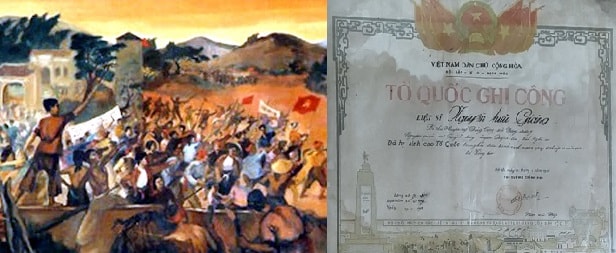
In 1926, comrade Thai Van Dac, a Tan Viet party member from Nghe An (from Ha Tinh), taught at Quynh Luu Primary School and contacted a number of people to establish the Tan Viet organization in Quynh Luu with the first party members such as: Nguyen Duc Mau, Nguyen Huu Giang, Nguyen Nhat Tien, Pham Tam Phiet, etc. From this organization, the propaganda and operation area of Tan Viet was expanded and greatly impacted the patriotism of the youth.
In early 1927, comrades Duong Dinh Thuy, Nguyen Huu Giang, and Hoang Ngoc An contacted Chu Trang and Chu Hue, two cadres of the Youth organization in Hoang Truong commune (Dien Chau), to work in Quynh Giang and Quynh Dien, to establish the Vietnam Revolutionary Youth Association in Quynh Luu. Comrade Nguyen Huu Giang was the one who founded and became the first Secretary of the Vietnam Revolutionary Youth Association in his commune (in 1927). During this time, the whole district had more than 20 party members of the Youth organization; by the end of 1928, there were nearly 30 Tan Viet party members. Along with the birth and activities of the Youth and Tan Viet organizations, in many places in the district, groups and guilds were established under the names of education promotion, fabric guilds, etc. to gather forces, propagate Marxism-Leninism, and mobilize the masses to fight against tyrants and evils in the countryside. After the revolutionary organizations were established, the struggle movement in Quynh Luu grew more and more.
In June 1929, the Indochinese Communist Party was born in the North and sent Nguyen Phong Sac and Tran Van Cung to Nghe An to contact Vo Mai to develop the base, then established the Indochinese Communist Party. in Central Vietnam, published the newspaper Bolshevik.
In July 1929, comrade Nguyen Huu Giang contacted the Indochinese Communist Party branch in Van Phan (Dien Chau), together with comrade Nguyen Duc Mau, head of the Tan Viet group, preparing to establish the Indochinese Communist Party in Quynh Luu. However, while the preparation work was on the way, on August 21, 1929, comrade Nguyen Huu Giang was arrested by the enemy and imprisoned in Vinh Prison, the establishment was temporarily stopped. In the imperial prison, Nguyen Huu Giang was brutally beaten and tortured for nearly 2 months, but he still refused to submit and refused to confess. Unable to find solid evidence to convict him, they finally had to release comrade Nguyen Huu Giang in early 1930.
After being released from prison, Nguyen Huu Giang, along with comrades teacher Nguyen Duc Mau (one of the former Tan Viet leaders in Thanh Son) and Dao Quang (a former Youth leader in Quynh Thuan), participated in leading the movement in the district, contacted the Indochina Communist Party bases in Vinh and Dien Chau, summoned loyal comrades in the two Youth and Tan Viet organizations in the district, and prepared for the establishment of the district Communist Party Committee.
After the Communist Party of Vietnam was born, on April 20, 1930, in Thanh Son (Son Hai), Quynh Luu, a conference of two organizations, Thanh Nien and Tan Viet, took place. The conference decided to establish the Communist Party of Vietnam in Quynh Luu district, approved the Party Committee's direction of operation, and elected a provisional Executive Committee consisting of 5 comrades: Nguyen Duc Mau (Secretary), Nguyen Huu Giang, Dao Quang, Nguyen Xuan Dao and Hoang Van Hop (District Committee member). The conference unanimously agreed to publish the newspaper "Labor"to propagate Marxism-Leninism to party members and enlighten the masses to fight against colonialism and feudalism.
In early May 1930, the provisional District Party Committee met to discuss the development of Party bases, assigning District Party Committee members to be in charge of each area in the district. Comrade Nguyen Huu Giang was assigned to direct and operate in the Dong Yen area (2 Party cells with 10 Party members were organized).
Under the leadership and direction of the Party, from the end of May 1930, the atmosphere of struggle throughout the country, especially in the two provinces of Nghe An and Ha Tinh, was as exciting as ever. Typically in Nghe An, there were demonstrations by farmers in the villages of Yen Dung, Loc Da, Duc Thinh (Hung Nguyen); An Hau, Duc Hau, Yen Dai (Nghi Loc)... which caused a great echo, having a certain influence on the situation in Quynh Luu.
Implementing the plan of Nghe An Provincial Party Committee on coordinating the struggle with other regions, with the encouragement of the revolutionary movement in Vinh - Ben Thuy, Hung Nguyen, Nghi Loc, Thanh Chuong, Quynh Luu District Party Committee held a Conference in mid-June 1930 in Quynh Thuan. The Conference decided to mobilize salt farmers in Thanh Vien commune to fight against the oppression and exploitation of imperialism and feudal lackeys to open a new period of revolutionary struggle in the district. This was the first time that comrades in the Executive Committee of Quynh Luu District Party Committee, such as: Nguyen Duc Mau, Nguyen Huu Giang, Dao Quang, ... led the people, mainly salt farmers, to stand up and fight directly with the Westerners to demand the settlement of their demands.
As planned, early in the morning of June 20, 1930 (that is, May 25, Canh Ngo year), on the main market day in Quynh Thuan, about 3,000 people from the roads of the eastern and southern villages of the district marched to Dinh market, where under the banyan tree, a cadre holding a red hammer and sickle flag was giving a speech calling for a struggle against oppression and exploitation by imperialism and feudalism. After listening to the speech, the group went to Phu Duc military post to make the following demands:
- Increase salt price by 30%
- Let people take some salt home to use, do not enter the house to check salt without permission.
- Free to pour water and scrape salt
- Do not beat salt workers.
- Must release political prisoners in all places...
The protesters, with banners in hand, were in high spirits. The enemy in Thanh Vien and Phu Hau communes did not dare to suppress them. The soldiers of Phu Duc station closed the gate and fled before the protesters arrived, leaving only the French station chief, Guyôơ, behind. The protesters broke down the station gate and entered. The station chief was frightened and had to accept the demands and promised to respond to the people in 3 days.
Building on their victory, the protesters marched to Thanh Dam station. The soldiers and bailiffs had fled, leaving only the station chief, pale-faced and trembling with fear. The protesters warned him and he promised that from now on he would not command his soldiers to bully the salt workers anymore.
The struggle on June 20, 1930, which broke out exactly two months after the District Party Committee was established, demonstrated the leadership capacity of the District Party Committee and the grassroots Party cell. Under the leadership of the District Party Committee Executive Committee, including comrade Nguyen Huu Giang, the revolutionary movement of the people of Quynh Luu developed strongly and achieved many victories.
Frightened by the growing strength of the movement, the French colonialists and their feudal lackeys, on the one hand, launched a campaign of white terror, and on the other hand, ordered secret police to search many areas in the two provinces of Nghe An and Ha Tinh, hoping to capture key leaders. In Quynh Luu, after many days of being hunted, comrades Nguyen Huu Giang, Nguyen Duc Mau, Dao Quang... fell into the hands of the enemy one after another. District chief Ton That Dinh took comrade Nguyen Huu Giang to Vinh prison for torture and interrogation. After the trial, he was sentenced by the Southern court of Nghe An province to 3 years of hard labor and 3 years of house arrest (according to Judgment No. 166/November 28, 1930) exiled to Kon Tum prison on charges of communist activities.
The life of prisoners in French colonial prisons in Vietnam in general and Kon Tum prison in particular was extremely miserable. Especially for political prisoners, the French colonialists treated them brutally, imposing harsh living conditions. Here, Nguyen Huu Giang was subjected to the most despicable, vile, brutal and barbaric tricks by the enemy to subdue his revolutionary spirit and patriotism. However, he learned the steadfast fighting spirit of his predecessors, courageously and courageously fought against all harsh regimes and participated in many struggles organized by his fellow prisoners, and always believed in the victory of the revolution led by the Communist Party. After a long period of enduring torture and all the cunning tricks of the enemy, Nguyen Huu Giang heroically sacrificed himself in the Kon Tum prison cell in 1933, at the age of 29, when his youth and revolutionary spirit were still surging.
In recognition of the great contributions of comrade Nguyen Huu Giang to the Party and the Vietnamese revolutionary movement, on November 17, 1947, his family was awarded the Certificate of Merit by the Fatherland under Decision No. 218/CP and many other noble titles by Prime Minister Pham Van Dong. The life and career of comrade Nguyen Huu Giang is a shining example of bravery, resilience, and lifelong struggle for the cause of national liberation for the young generations today and tomorrow to learn and follow./.
------
Reference books
1-According to the LSDB Book of Quynh Hong commune in 2007.
2- According to prison records kept at the XVNT Museum (issued by the Ministry of Public Security).
3- LSDB Quynh Luu book 2000.
4- According to the book Communist Mirror, volume 5.
5-Provided by Mr. Nguyen Huu Giang's family.

